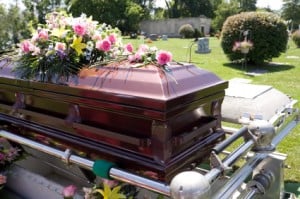Preparing for death is not only a matter of reaching a state of emotional and spiritual acceptance of your fate. Although coming to terms with your own mortality is an important part of the cycle of life, you also need to take some time to deal with the everyday bureaucracies. To ease the burden on your family and ensure that your wishes will be taken into account as you approach your final days, make sure you have these five documents filled out and filed with the appropriate overseeing body. (more…)
Archive for the ‘Legal’ Category
5 Legal Documents to Fill Out Before You Die
Tuesday, August 28th, 2018Where to Find Local Burial Law Information
Wednesday, December 13th, 2017When you choose burial through a funeral home or cemetery, most of the legal questions are already answered for you. Your funeral director can tell you what is allowed and what is illegal for your specific county/state, and will even file most of the required paperwork for you. (more…)
Five Reasons to Donate Your Body to Science
Monday, November 9th, 2015Although the option to donate your body to science instead of having it buried or cremated has been around for decades, it’s an option many people have a hard time considering. After all, when your body becomes a learning tool for the next generation of doctors and scientists, you are unable to hold a traditional burial. (more…)
What is the Difference between a Casket and a Coffin?
Saturday, February 28th, 2015 Outside the funeral industry, the terms “casket” and “coffin” are often used interchangeably to describe the vessel in which the deceased is placed before being buried in the ground. Most people recognize both words, and are comfortable using both in situations related to death and burial.
Outside the funeral industry, the terms “casket” and “coffin” are often used interchangeably to describe the vessel in which the deceased is placed before being buried in the ground. Most people recognize both words, and are comfortable using both in situations related to death and burial.
In reality, a casket and a coffin are not the same things. A coffin (a term that has been around since the 1500s) is the traditional burial box we associate with death. Shaped to fit the human body (with six or eight sides, wider at the top for the arms and torso), a coffin is designed to be built fairly cheaply and with a minimum amount ofmaterials. Because many people in history built their own coffins, or hired a coffin maker to do it, the emphasis was on practical burial that didn’t put a strain on family finances. Coffins are almost always made of wood instead of more valuable metals.
What to Do with a Wedding Ring when a Loved One Dies
Tuesday, February 24th, 2015Few pieces of jewelry have more meaning than a wedding ring. Although family heirlooms, class rings, sports jewelry, and other items often have sentimental value of their own (not to mention high price tags), it’s the sign of our lasting commitment that carries the most weight.
When a spouse or parent dies, it can be difficult to know how to handle the issue of the wedding ring. Should it be buried with the deceased? Kept aside to be passed down to the next generation? Otherwise memorialized so that everyone can enjoy it? (more…)
How to Choose a Funeral Director
Wednesday, December 10th, 2014 When you’re choosing a funeral home to help you with funeral planning, you’re not just considering which facility is best—you’re also interviewing funeral directors. Because you’ll be relying on one individual for so much of your support and decision-making, it’s important that you feel a connection with your funeral director built on trust and understanding. Although you probably won’t have time to call and get to know every funeral director in the event of a sudden death, you can take a few minutes to chat with them to get a feeling for who you’d like to work with.
When you’re choosing a funeral home to help you with funeral planning, you’re not just considering which facility is best—you’re also interviewing funeral directors. Because you’ll be relying on one individual for so much of your support and decision-making, it’s important that you feel a connection with your funeral director built on trust and understanding. Although you probably won’t have time to call and get to know every funeral director in the event of a sudden death, you can take a few minutes to chat with them to get a feeling for who you’d like to work with.
What Does a Funeral Director Do?
Financial Spring Cleaning
Tuesday, August 5th, 2014 Spring is a time of renewal and rebirth, when the melting snow gives way to new life and people start reorganizing their closets for the warm season to come. Financial experts also suggest you use this time to consider pulling out your estate and funeral planning to ensure that everything is in order and up-to-date.
Spring is a time of renewal and rebirth, when the melting snow gives way to new life and people start reorganizing their closets for the warm season to come. Financial experts also suggest you use this time to consider pulling out your estate and funeral planning to ensure that everything is in order and up-to-date.
Where to Start?
When we talk about making advance estate and funeral plans, we mean much more than putting money in a 401(k) or taking out a life insurance policy. While both these things are great first steps, they don’t encompass the breadth of options available to you as you organize your end-of-life plans. (more…)
Cremation FAQs
Thursday, April 17th, 2014Cremation is a way of disposing of bodily remains that is both economical and ecologically friendly. Although many people choose cremation for personal, cultural, or religious reasons, the reality is that most people opt for cremation because of its relatively low cost (when compared to burial).
How Does Cremation Work?
In the process of cremation, a body is exposed to high levels of heat and flame for 1 to 3 hours. During this time, the body is broken down into ashes and large bone fragments (which are later ground down to give the appearance of ash). Family members are then able to collect these ash remains, also known as cremains, to be disposed of however they wish.
Who Performs a Cremation?









